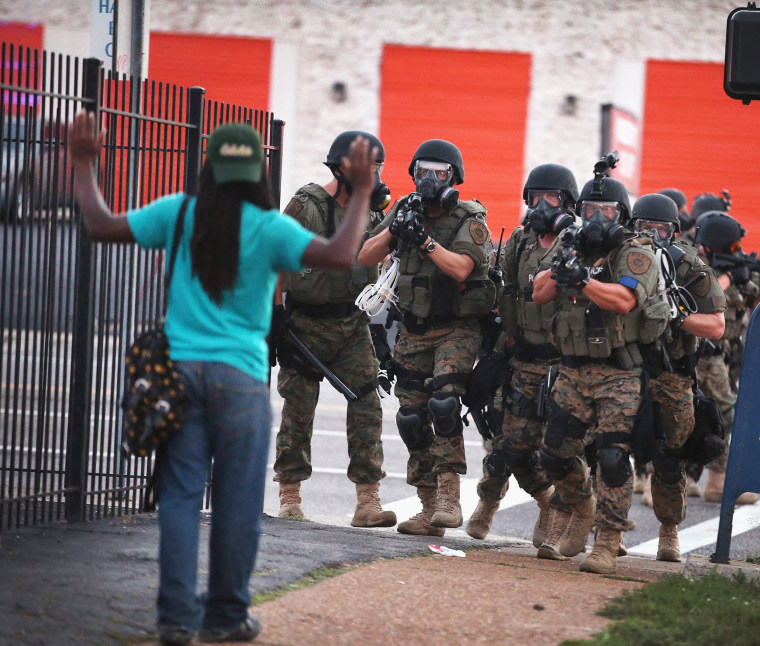A new report examining the causes of the the unrest following the death of Michael Brown recommends that police dramatically cut back on their use of military-style tactics and weapons.
Law enforcement in the St. Louis region should "minimize use of militarized weaponry," according to the 197-page report entitled "Forward Through Ferguson: A Path Toward Racial Equity" released early Monday. It was compiled by a 16-member commission appointed by Gov. Jay Nixon.
Brown, 18, was shot dead by a white officer in Ferguson, Missouri, on August 9, 2014.

"Direct the state to cease providing, and local departments to cease using, militarized weaponry" that is not proportional to the situation, the report stated.
This recommendation dovetails with that of an Aug. 3 Justice Department report that concluded that the use of dogs, snipers and tactical vehicles designed for the military "inflamed tensions and created fear among demonstrators" in the wake of Brown's shooting death at the hands of officer Darren Wilson.
Images of police in military fatigues and wielding assault rifles deployed to deal with Ferguson demonstrators sent shock waves around the country and achieved headlines worldwide.
The handling of the protests following the shooting and the subsequent grand jury decision to not indict Wilson prompted intense criticism of the largely white police force. A series of subsequent police shootings and deaths of black people in custody around the country also helped spark nationwide attention to the treatment of African Americans and other minorities by police.
Related: Ferguson Cancels Thousands of Arrest Warrants
The Ferguson Commission also called for sweeping changes in law enforcement, the justice system and the treatment of demonstrators, and shed light the deep racial and economic divisions it said plagued the area. From page one, the report set out to show that the law and justice was not being applied equally in Ferguson, and that the region as a whole was deeply divided along racial and class lines.
"We know that talking about race makes a lot of people uncomfortable. But make no mistake: this is about race," the report stated in its introduction. To back up this finding, it noted that in Missouri, black motorists are 75 percent more likely than white ones to be stopped at traffic stops. Black and Hispanic residents are more than 70 percent more likely to be searched, and 90 percent more likely to be arrested, it added.
"The law says all citizens are equal. But the data says not everyone is treated that way," according to the report.
While the commission cannot enforce the changes it recommend, it included lengthy discussions on how to implement the suggestions.
In an effort to increase trust and cooperation between the population and the forces, the report called for the establishment of a state-wide and publicly available database to track police shootings, the creation of municipal and county-level civilian review boards, and revamped police training programs. It also called for the consolidation of law enforcement agencies and municipal courts.
"One of the most basic tenets of justice is the idea that punishment should fit the crime. In the St. Louis region, minor offenses can easily lead to major, disproportionate punishments," the document added.
Related: Black St. Louis Suburbs Hit With Ticket Blitz
"When someone is jailed for failure to pay tickets, the justice system has not removed a dangerous criminal from the streets," the report added. "In many cases, it has simply removed a poor person from the streets."
In order to deal with these issues, it suggested courts stop incarcerating people for minor offenses, establish options for alternative sentencing and treat nonviolent offenses as civil violations.
It also dealt with economic, health and educational reforms needed to help address inequality.
